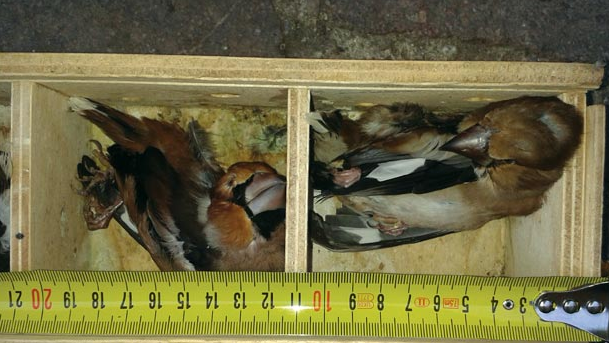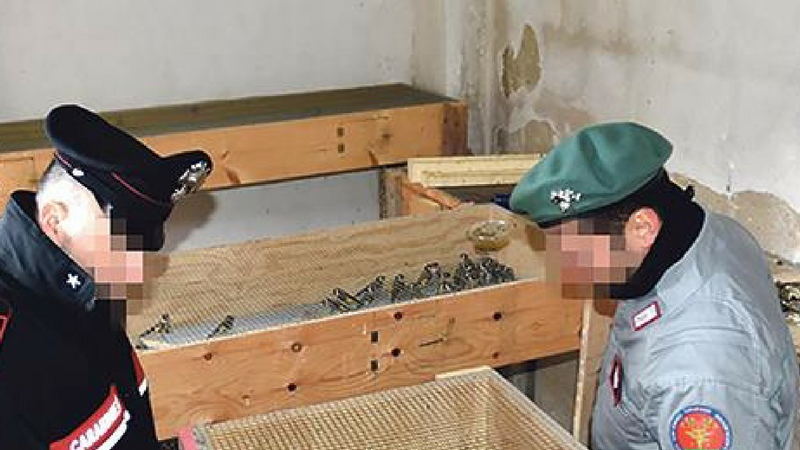Police investigations in southern Italy have exposed a smuggling route for birds poached in Italy and sold in Malta, highlighting concerns that if the Maltese government decides to open another trapping season it would provide a market for poachers.
The investigation launched in 2016 and concluded in May this year, led to the arrest of seven people. The gang used to poach no less than 200 to 300 birds a day for a market value of €25 to €100 depending on the species.
Reggio Calabria prosecutor Giovanni Bombardieri said: “It is good to remember that on the island of Malta about 9,000 trapping sites were permitted and the live birds captured in Calabria were used as callers,” Oggi Sud reported.
Bombardieri explained that the live birds captured in Calabria were sent to Malta from Pozzallo. The illegal trade generated about €1 million a year.
About 3,000 trappers were allowed to use up to 21 live caged-finches each in order to lure wild finches to their trapping site, creating a huge demand for smuggled birds.
The illegal business in wildlife, dubbed Zoomafia, is related to crimes against animals such as animal abuse, trafficking, illegal trapping and the hunting and trade of animals.
Nicholas Barbara, from Birdlife Malta, told The Shift News: “The illegal trade in finches is well known, and it has been happening for a long time. It was especially boosted when government re-opened the finch trapping season in 2014. About 3,000 trappers were allowed to use up to 21 live caged-finches each in order to lure wild finches to their trapping site, creating a huge demand for these birds, for which poachers in Italy obliged.”
Asked about the action the authorities have taken against these crimes, Barbara said: “As a result of some custom checks and occasional police interventions, a few local traders were taken to court. But the process in court is so long and the fines imposed so minimal, that when compared to the profits made by this trade, local enforcement has not done much to curtail this abuse.”

Close to 500 protected wild finches smuggled into the country in 2014 died while being held as court evidence. Photo: Birdlife Malta
A report on Zoomafia by the Italian organisation LAV, published on 11 July, shows that in Italy reports increased by 3.74%, but legal action has decreased by -1.08%. It is estimated that every 55 minutes a new report is filed against a person.
The 2017 report also features Malta. According to the study, Malta is a destination country for illegally trapped protected birds. “Even in the Ragusa region, specialised groups capture thousands of birds every year and export them to Malta. This also included the killing of protected species such as pink flamingo, buzzard, Bonelli’s eagle and black stork,” the report states.
Malta’s reputation was damanged further when on 12 January, Maltese hunters where held in Pozzallo by the Guardia the Finanza for having several dozen dead protected birds. The hunting tour was held in the provinces of Ragusa and Siracuza.
Two gangs of bird traffickers where caught in Reggio Calabria – a ring that led to tens of thousands of small birds being sold for millions of euro.
The investigation shows that Malta provided a market for finches, goldfinches and other song birds traditionally used by Maltese trappers.
When asked for comments about the seriousness of the situation in trading and smuggling of birds, Barbara said: “At a national level, the trade in wild-captured animals is largely unmonitored. It is common practice for bird trappers to exchange wild caught birds, and it is very difficult to quantify such matters. The trade reported by Italian authorities, however, points to close links in Malta, so undoubtedly there is an extension of these activities within Maltese circles”.
Last month, Malta lost its case on finch trapping at the Europe Court of Justice, which the European Commission said confirmed the Commission’s position that there is no justification for finch trapping in Malta.
“Finches are strictly protected under the EU Birds Directive. Malta had to end finch trapping by the end of 2008 after a transition period it had negotiated when joining the EU had expired. The Commission now expects Malta to fully respect the Court’s judgement and to stop this practice once and for all,” the Commission had said in a statement.












